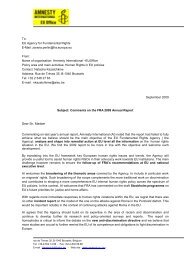Time for eULeX To prioriTize war crimes - Amnesty International ...
Time for eULeX To prioriTize war crimes - Amnesty International ...
Time for eULeX To prioriTize war crimes - Amnesty International ...
Create successful ePaper yourself
Turn your PDF publications into a flip-book with our unique Google optimized e-Paper software.
Kosovo: <strong>Time</strong> <strong>for</strong> EULEX to prioritize <strong>war</strong> <strong>crimes</strong> 37<br />
Neglecting instances of sexual violence in post-conflict areas negatively affects and slows the restoration of<br />
peace and feeling of security in the community. Further, United Nations Security Council Resolution (UNSCR)<br />
1325 on Women, Peace and Security (2000) calls <strong>for</strong> the protection of women and girls from gender-based<br />
violence, particularly rape and other types of sexual abuse.<br />
War-time violence has affected women’s physical health and reproductive health. It also has had serious<br />
consequences <strong>for</strong> the mental health of people in Kosova. Research has suggested that approximately onefourth<br />
(and some activists believe that as much as half) the population suffers from Post-Traumatic Stress<br />
Disorder (PTSD). Women and men whose family members disappeared during the <strong>war</strong> continue to suffer<br />
trauma. Women who have missing family members face additional challenges of accessing property and<br />
assets to<strong>war</strong>ds securing a living independently. Their losses during the <strong>war</strong> of both loved ones and property<br />
have yet to be compensated.<br />
We would like to strongly encourage your public acknowledgement of <strong>war</strong>-time rape as a crime, and urge you<br />
to include these <strong>crimes</strong> in your investigation of <strong>crimes</strong> that took place in Kosova during the <strong>war</strong>. We would like<br />
to offer our full cooperation and assistance. As a network of 68 women’s organizations throughout Kosova, we<br />
have access to women who have suffered <strong>crimes</strong> as well as trained experts who have a sensitive approach in<br />
working with women still dealing with trauma. We look <strong>for</strong><strong>war</strong>d to hopefully cooperating with you in the<br />
future”. 105<br />
As of October 2011, KWN had not received a reply. However, following a demonstration entitled, “Forget<br />
Flowers: We want justice <strong>for</strong> women raped in the <strong>war</strong>”, held in Pristina on 8 March 2012, KWN reported that<br />
they had received positive responses from the Kosovo authorities and EULEX. 106<br />
PROSECUTIONS FOR CRIMES OF SEXUAL VIOLENCE<br />
Despite the many credible reports of rape and other <strong>for</strong>ms of sexual violence, to date, only<br />
four prosecutions <strong>for</strong> such <strong>crimes</strong> under international law have been conducted and only one<br />
of them in the Kosovo courts.<br />
At the Tribunal, the Trial Chamber found in Milutinović et al that there was “a broad<br />
campaign of violence directed against the Kosovo Albanian civilian population during the<br />
course of the NATO airstrikes, conducted by <strong>for</strong>ces under the control of the FRY and Serbian<br />
authorities, during which there were incidents of killing, sexual assault…..” including the<br />
rape of women in the municipalities of Decani/Dečan, Srbica, in Beleg village (Peć), Ćirez<br />
(Kline) and Pristina. The Trial Chamber classified sexual assault as a <strong>for</strong>m of persecution, as<br />
a crime against humanity. 107 The Trial Chamber considered that two of the accused, <strong>for</strong>mer<br />
VJ General Pavković and Police General, and Assistant Minister of Internal Affairs, Sreten<br />
Lukić,, in occupying position of command responsibility, had reason to <strong>for</strong>see, and there<strong>for</strong>e<br />
prevent, such sexual assaults. 108<br />
In the Kosovo courts, in September 2000, a Montenegrin, Miloš Jokić, was convicted at<br />
Gnjilane/Gjilan District Court of <strong>war</strong> <strong>crimes</strong>, including a crime of sexual violence, Proceedings<br />
had been brought by a local prosecutor. The conviction was reversed on appeal by an<br />
international panel of UNMIK judges at the Supreme Court on grounds that the District Court<br />
had failed to consider the evidence carefully and failed to call defence witnesses. The retrial,<br />
prosecuted by an international UNMIK prosecutor led to an acquittal on the ground that the<br />
eye-witness identification was not credible. 109<br />
Index: EUR 70/004/2012 <strong>Amnesty</strong> <strong>International</strong> April 2012



